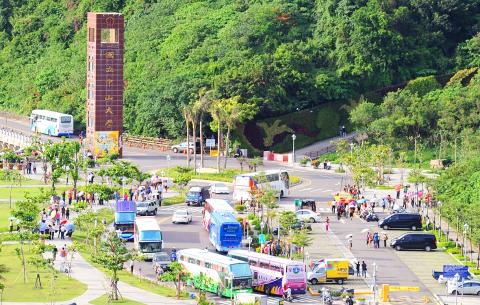Residents of the Hamasen area (哈瑪星) in Kaohsiung yesterday protested at a public hearing with city officials over Chinese tourists to the Sizihwan Scenic Area (西子灣), saying the surge of visitors has disrupted traffic, while business at local stores continues to suffer.
Chinese tourists are like “locusts,” because they arrive in swarms, Hamasen resident Lin King-li (林金利) said, adding that many litter, urinate and defecate on the streets.
He criticized the city government’s tourism policy, which focuses on boosting the number of Chinese visitors, saying that local businesses are not making any more profit from the increased tourism.

Photo: Chang Chung-i, Taipei Times
If the situation continues, Taiwan could become the next Hong Kong, he said.
Tourists do not necessarily bring revenue to a business, National Sun Yat-sen University educator Yu Chien-yuan (余建源) said.
He said the situation in Sizihwan is evidence that Chinese travel agencies that offer bargain packages do not boost tourism income, as the agencies take their clients dining and shopping only at stores they are affiliated with.
As a result, not only are people not receiving the revenues they were promised, the city has to use taxpayers’ money to clean up the mess caused by Chinese tourists, while Chinese businessesprofit.
Members from the Hamasen Vision Alliance and several other self-help groups said that Chinese visitors have degraded residents’ quality of life.
Meanwhile, the Kaohsiung City Government said that it would limit tour buses from 3pm to 7pm, starting on Sunday.
Bus access to the Sizihwan Scenic Area is to be capped at 15 vehicles every 20 minutes, it said.
Residents at the hearing called the move a “band-aid.”
Kaohsiung City Councilor Lee Chiao-ju (李喬如) said that Sizihwan is better without Chinese tourists if all they do is “pee and litter,” while Kaohsiung City Councilor Chien Huan-tsung (簡煥宗) called on the city’s Tourism Bureau to prepare a report on tourist-related problems.
He urged the city government to establish a committee of residents and academics to work out a long-term mitigation plan.

Alain Robert, known as the "French Spider-Man," praised Alex Honnold as exceptionally well-prepared after the US climber completed a free solo ascent of Taipei 101 yesterday. Robert said Honnold's ascent of the 508m-tall skyscraper in just more than one-and-a-half hours without using safety ropes or equipment was a remarkable achievement. "This is my life," he said in an interview conducted in French, adding that he liked the feeling of being "on the edge of danger." The 63-year-old Frenchman climbed Taipei 101 using ropes in December 2004, taking about four hours to reach the top. On a one-to-10 scale of difficulty, Robert said Taipei 101

Nipah virus infection is to be officially listed as a category 5 notifiable infectious disease in Taiwan in March, while clinical treatment guidelines are being formulated, the Centers for Disease Control (CDC) said yesterday. With Nipah infections being reported in other countries and considering its relatively high fatality rate, the centers on Jan. 16 announced that it would be listed as a notifiable infectious disease to bolster the nation’s systematic early warning system and increase public awareness, the CDC said. Bangladesh reported four fatal cases last year in separate districts, with three linked to raw date palm sap consumption, CDC Epidemic Intelligence

Two Taiwanese prosecutors were questioned by Chinese security personnel at their hotel during a trip to China’s Henan Province this month, the Mainland Affairs Council (MAC) said yesterday. The officers had personal information on the prosecutors, including “when they were assigned to their posts, their work locations and job titles,” MAC Deputy Minister and spokesman Liang Wen-chieh (梁文傑) said. On top of asking about their agencies and positions, the officers also questioned the prosecutors about the Cross-Strait Joint Crime-Fighting and Judicial Mutual Assistance Agreement, a pact that serves as the framework for Taiwan-China cooperation on combating crime and providing judicial assistance, Liang

US climber Alex Honnold left Taiwan this morning a day after completing a free-solo ascent of Taipei 101, a feat that drew cheers from onlookers and gained widespread international attention. Honnold yesterday scaled the 101-story skyscraper without a rope or safety harness. The climb — the highest urban free-solo ascent ever attempted — took just more than 90 minutes and was streamed live on Netflix. It was covered by major international news outlets including CNN, the New York Times, the Guardian and the Wall Street Journal. As Honnold prepared to leave Taiwan today, he attracted a crowd when he and his wife, Sanni,